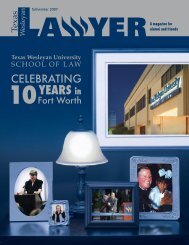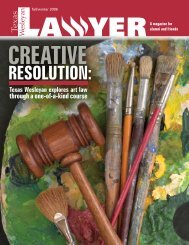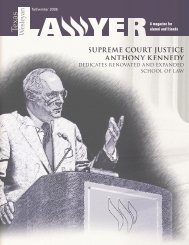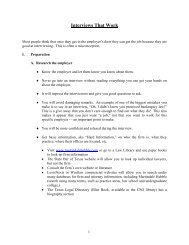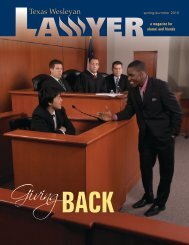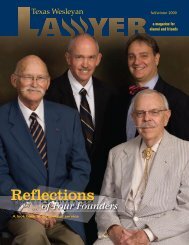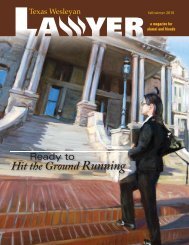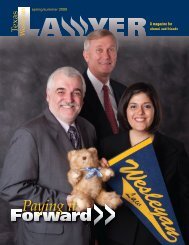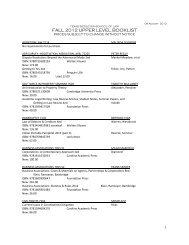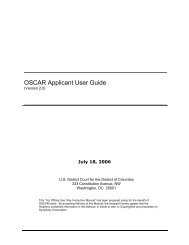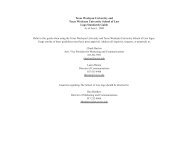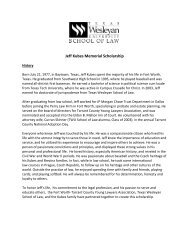View the Heller v. City of Dallas opinion here
View the Heller v. City of Dallas opinion here
View the Heller v. City of Dallas opinion here
Create successful ePaper yourself
Turn your PDF publications into a flip-book with our unique Google optimized e-Paper software.
Case 3:13-cv-01479-P Document 12 Filed 04/19/13 Page 4 <strong>of</strong> 12 PageID 103<br />
merits, (2) a substantial threat <strong>of</strong> irreparable injury if <strong>the</strong> injunction is not issued, (3) <strong>the</strong><br />
threatened injury if <strong>the</strong> injunction is denied outweighs any harm that will result if <strong>the</strong> injunction<br />
is granted, and (4) <strong>the</strong> grant <strong>of</strong> <strong>the</strong> injunction will not disserve <strong>the</strong> public interest.” Janvey v.<br />
Alguire, 647 F.3d 585, 595 (5th Cir. 2011) (citing Byrum v. Landreth, 566 F.3d 442, 445 (5th<br />
Cir. 2009)). “A preliminary injunction is an extraordinary remedy.” La Union del Pueblo<br />
Entero v. FEMA, 608 F.3d 217, 219 (5th Cir. 2010). “The purpose <strong>of</strong> a preliminary injunction is<br />
merely to preserve <strong>the</strong> relative positions <strong>of</strong> <strong>the</strong> parties until a trial on <strong>the</strong> merits can be held.”<br />
Univ. <strong>of</strong> Tex. v. Camenisch, 451 U.S. 390, 395 (1981). Thus, “a preliminary injunction is<br />
customarily granted on <strong>the</strong> basis <strong>of</strong> procedures that are less formal and evidence that is less<br />
complete than in a trial on <strong>the</strong> merits.” Id. The Court may accept o<strong>the</strong>rwise inadmissible<br />
evidence, including hearsay evidence, “in <strong>the</strong> form <strong>of</strong> deposition transcripts and affidavits.”<br />
Sierra Club, Lone Star Chapter v. F.D.I.C., 992 F.2d 545, 551 (5th Cir. 1993).<br />
Order<br />
3:13-CV-1479-P<br />
Page 4 <strong>of</strong> 12<br />
A. Success on <strong>the</strong> Merits<br />
Government Interest<br />
Regardless <strong>of</strong> whe<strong>the</strong>r <strong>the</strong> Ordinance is content-based or content-neutral, <strong>the</strong> <strong>City</strong> must<br />
demonstrate that it has some meaningful interest in more stringent regulation <strong>of</strong> traffic at or near<br />
<strong>the</strong> sidewalk <strong>of</strong> Expressway Tower. Courts use varying standards in evaluating <strong>the</strong> propriety <strong>of</strong><br />
government regulation <strong>of</strong> free speech. The most demanding standard <strong>of</strong> review is known as<br />
strict scrutiny, w<strong>here</strong>upon <strong>the</strong> government must demonstrate that “<strong>the</strong> restriction [is] narrowly<br />
tailored to serve a compelling government interest.” Christian Legal Soc'y Chapter <strong>of</strong> <strong>the</strong> Univ.<br />
<strong>of</strong> Cal., Hastings Coll. <strong>of</strong> <strong>the</strong> Law v. Martinez, --U.S.--, 130 S.Ct. 2971, 2984 n. 11 (2010)<br />
(emphasis added). W<strong>here</strong> a regulation is content-neutral and restricts <strong>the</strong> time, place, and<br />
manner <strong>of</strong> speech, courts apply intermediate scrutiny, which requires <strong>the</strong> government to



